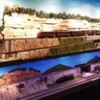Hello all,
I recently installed a woodland scenics 4% grade onto my layout. I have a MTH premier SP GS-4 that had made it up the grade no problem the first several days and since has slipped up the hill. I would understand if I was pulling 10 cars, but I'm only pulling 4-5 passenger cars. It is obvious to me the traction tires are no longer doing their job. Is there anything I can do to help them out or are they shot? They look to be in good condition, but there is simply no traction on the rails. Any thoughts or suggestions would be appreciated! The locomotive is only a few months old. I didn't expect the tires to fail so quickly.
Thanks,
Marc






